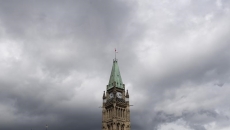OTTAWA - The National Advisory Committee on Immunization is now recommending teenagers with underlying conditions or at high risk of COVID-19 exposure get a booster shot.
The advice comes as more provincial health officers are transitioning to a position of learning to live with COVID-19 and loosening public health restrictions.
Chief public health officer Dr. Theresa Tam says kids and adolescents are still at low risk of serious illness in general from COVID-19 but because of the high rate of infection due to Omicron more kids are being admitted to hospital.
Health Canada data suggest in the last week 251 children under 12 and 84 adolescents between 12 and 19 were admitted to hospital with COVID-19.
That data is not broken down by vaccination status but Tam said teenagers with two doses are at very low risk of severe outcomes, which is why for now Canada isn't following the U.S. Centers for Disease Control and Prevention and recommending all adolescents get a third shot.
Just over half of Canadian children five to 11 now have at least their first dose, while 82 per cent of teens 12 to 17 are fully vaccinated. Most kids five to 11 only became eligible for their second dose in late January and there is no talk of boosters for that age group yet.
NACI's new advice for teenagers between 12 and 17 is to get a booster if they have an underlying medical condition or live in congregate settings or racialized or marginalized communities that have been hard hit by COVID-19 infections.
The booster should be six months after their last dose, and would include fourth doses for teenagers with severely compromised immune systems who got a third dose as part of the primary vaccination series.
"This is their recommendation right now," Tam said of NACI. "That doesn't mean it couldn't shift. But they will monitor the evolving evidence and update the guidance as needed."
Tam said NACI is also now looking at what to tell people about getting a booster shot after they have been infected with COVID-19, advice needed after the number of people infected with Omicron hit new highs.
How high is hard to know, because the widespread PCR testing used in previous waves disintegrated under the sheer weight of Omicron's infection rate. Tam said indicators including the percentage of tests coming back positive and wastewater tracking are continuing to show Omicron is starting to wane.
Tam said there are also immunity studies underway looking to test for Omicron antibodies in blood samples that will give us a far better picture of population-based immunity and help drive more decisions about whether COVID-19 is shifting into endemic status.
An endemic virus is one that is constantly present in an area, usually with mostly mild impacts, such as flu. The World Health Organization warned it's too early to see COVID-19 as endemic because of the widespread infection rates all over the world but Tam said she is "certainly cautiously optimistic" we're getting close.
"I think it would be great to be driven by a bit more data," she said.
Even so, many provinces are moving to lift restrictions and treat COVID-19 waves more like flu seasons. Saskatchewan moved Friday to stop requiring people who come into close contact with COVID-19 to isolate, and those who get sick will only have to isolate for five days regardless of vaccination status.
“So many of us, on any given time, are notified as a close contact and it’s really not feasible for us to isolate every time we’re a close contact,” chief medical health officer Dr. Saqib Shahab said Thursday.
Ontario chief medical health officer Dr. Kieran Moore said Thursday we have lived with the fear of COVID-19 driving decisions for two years and we need to adjust our thinking now, as Omicron starts to wane.
"I think we have to start to understand we have to learn to live with this virus," Moore said.
He said a new troubling variant could upend that hope, however.
Tam said the new sublineage of Omicron, BA.2, is being monitored but isn't currently of much concern.
She said Canada has been finding it as far back as November, and while it sometimes makes it harder to pick up Omicron on a test, it does not appear to be causing more severe illness than the original Omicron.
Hospitalizations and deaths from Omicron are still high — the number of daily deaths averaged 168 in the last week, Tam said, the highest it has been since the early days of the pandemic in April and May 2020.
An average of 10,800 people were in hospital with COVID-19 over the last seven days, up from 10,041 the previous week. These numbers blow away the pre-Omicron hospitalization record of about 5,000 in mid-January 2021.
There were 1,200 people in ICU, up from 1,143 a week earlier. The record for ICU admissions with COVID-19 was almost 1,400 during the Delta wave last May.
This report by The Canadian Press was first published Jan. 28, 2022.






